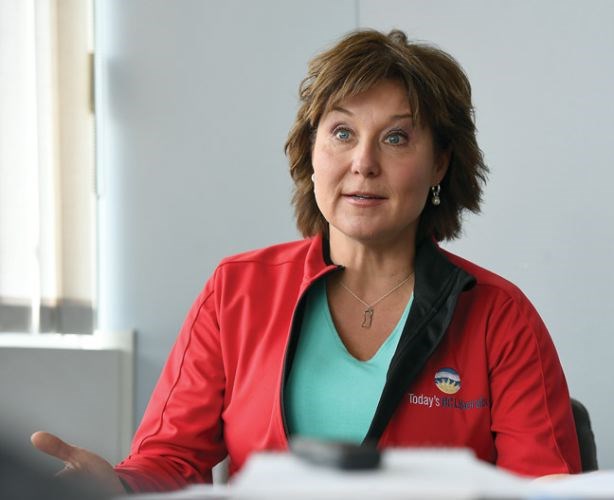The day after the first B.C. leaders debate on television, Christy Clark was out on the road in Quesnel and Prince George. She stopped in to visit The Citizen newsroom for an exclusive interview.
The only time she repeated herself, during the group interview, was in saying she could fix the shortfalls in B.C.'s social system.
The money was there, she said, because of prudent fiscal management. She knew there were cases thrown out of court because of a slow judicial system, that there were patients suffering because of healthcare failings and there were issues in education.
However, the solution to those problems, she said, was to deploy provincial income - income that can only come from a B.C. Liberal government.
"We can afford it now. We introduced the Jobs Plan in 2011, and we have been working full-out to build the economy through very tough times. And we did it. And now we are in a position to pay dividends back to people," she said.
"But we're doing it as we can afford it, which is the difference between us and them," referring to the NDP and Green parties who are the main challengers to her governing Liberals.
Us and them. It's always the tit-for-tat parlance of any election campaign. The message used on the hustings in 2017 has been repeated for the past 17 years by the governing Liberals: the NDP of today is just like the NDP that got ousted for the economic blunders of the 1990s.
For a sizable portion of the voting population - the young adults of the province, many of whom huddle together in the undecided camp - remembering the 1990s goes no further than Snapple in their sippy-cups, Pavel Bure in an ugly uniform, and Nirvana playing in the cassette deck.
There is no visceral memory one way or another of how the NDP handled their time in government.
"I think you'd be surprised," Clark said of youth understanding the political playing field.
"I think a lot of parents have talked to their kids about those hard times, especially in a place like Prince George were the unemployment rate was at, what, 17 per cent, in 1999? That was 17 years ago, a long time in a kid's life, but people's lives were really affected by that.
"But I also think - the other side of that coin - is how well are we doing now? We are No. 1 in the country in job growth,
No. 1 in economic growth, the unemployment rate hasn't been this low in comparison to the rest of the country since 1976. So people who don't remember the '90s can look across the country and they will know we are doing a lot better (than the rest of Canada).
"We're on a roll now, in British Columbia, we're just getting started, let's not go backward."
Clark used her time in northern B.C. to underscore the region's contribution to the province.
Part of the reason the Port Mann Bridge toll is in place, she said (a leading campaign discussion in the Lower Mainland) is because the resource wealth of the north, interior and eastern regions are what largely fund public capital projects, and she didn't want northerners to be on the entire hook for that bridge, the users of it should pay too, especially since taking the Port Mann Bridge is a commuter convenience (other bridges are available, should you wish to avoid the toll).
She also promised another $200-million coming to the ongoing Cariboo Connector double-lane sequence, and an entire focus on small town and interior community sustainability in the face of B.C. urbanization trends.
She urged voters to look up the Rural Economic Diversification Plan, the creation of which she credited in part to local MLAs Mike Morris and Shirley Bond.
"The idea is, it will create 26,000 jobs in rural British Columbia through things like planting $150-million worth of trees, the rural connectivity program, and it is there to bridge rural B.C. through a tough commodity cycle.
"When we have this global slowdown in commodities, we know we have to be there for rural British Columbia. Then, when it booms again, you'll be back up where you were a few years ago. Until then, you need government to be there with you."
The biggest concern in forestry-heavy communities became the softwood lumber agreement, almost overnight.
U.S. President Donald Trump had been silent on the issue of the expired trade pact until he suddenly criticized Canada's lumber trading position in a statement made Thursday.
Clark said she had been in tough softwood lumber disputes in the past, so this wasn't a new position, she expected the American housing and construction industries - sectors heavily on-side with Canadian wood - to weigh in on the President's position.
But Clark said the ultimate aim was diversification of B.C.'s lumber map. She was bullish on Asian-Pacific inroads.
"We are out there, getting into new markets," she said, in close concert with the federal government.
"What I would like to do is diversify our markets so much into China, Japan, Korea and India that we don't need a softwood deal (with the U.S.A.) That's the big goal for us."
First, though, is getting out the vote. The provincial election is coming on May 9.



